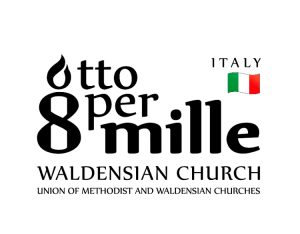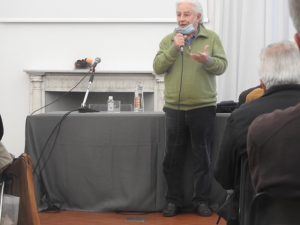

NWRG ha realizzato, o sta realizzando, i seguenti progetti sostenuti con i fondi Otto per Mille della Chiesa Valdese:
OPM/2021/22715 Sostegno allo screening per malattie infettive neonatali nella striscia di Gaza, Palestina, concluso. Contributo totale utilizzato per il progetto: € 43.065,22.
Il progetto ha permesso di fornire al laboratorio del Ministero della Salute a Gaza i materiali. altrimenti non disponibili, per la diagnosi e cura delle sepsi neonatali nei reparti di cura intensiva neonatale, ha cosi garantito la continuità di questo servizio essenziale
OPM/2022/32180 Provvedere medicine essenziali e strumenti per salvare neonati immunocompromessi ed altri neonati a rischio a Gaza, Palestina, concluso. Contributo totale utilizzato per il progetto: € 47.000,00
Il progetto ha permesso di procurare medicamenti (gamma immunoglobuline), necessari per la sopravvivenza di neonati ad alto rischio di morte perché immunocompromessi, e un ventilatore portatile, necessario per la ventilazione di neonati gravi che richiedono trasferimento in ospedali specializzati. Il ventilatore è stato consegnato nel febbraio 2023 all’unità di cura intensiva neonatale dell’Ospedale pediatrico Nasser di Gaza City. Un totale di 67 fiale di immunoglobuline, dopo un lungo periodo di ricerca dei necessari quantitativi di tale farmaco, attualmente di molto difficile reperimento, è stato consegnato in due lotti, nel giugno e nel luglio 2023, alla farmacia centrale del Ministero della Salute di Gaza per la sua distribuzione alle tre unità di cura intensiva neonatale degli ospedali Al Shifa (GazaCity), Al Taheer (Kan Younes), Al Nasser (Gaza City).
OPM/2023/44516 Provvedere strumenti e medicine salvavita a neonati e bambini nelle Maternità e negli Ospedali Pediatrici della striscia di Gaza, Palestina, concluso. Contributo totale utilizzato per il progetto: € 45.000,00.
Il progetto, presentato a gennaio 2023 quando le strutture sanitarie di Gaza, pur nelle ristrettezze dovute al perdurante blocco imposto alla Striscia, erano ancora operanti, ha preso avvio solo ad ottobre dello stesso anno, subito dopo l’inizio dei pesanti attacchi alla Striscia di Gaza, che hanno determinato la quasi completa distruzione del sistema sanitario e ridotto la popolazione della Striscia a condizioni di vita spaventose. Per tali motivi il progetto è stato rimodulato con una sola finalità: fornire latte in polvere per la sopravvivenza dei neonati pretermine, in forte aumento percentuale nella Striscia, e degli infanti che le madri non riescono ad allattare a causa del loro stato di denutrizione. Grazie alle informazioni fornite dal Gaza Neonatal Network si sono potute stimare le necessità di latte delle diverse unità di maternità e cura intensiva ancora operanti e, in diverse fasi, sono state acquistate 6820 confezioni da 400 g di diverse formulazioni di latte, distribuite alle diverse strutture sanitarie, trasferite grazie alla collaborazione con l’associazione dei pediatri giordani. Data la buona riuscita di questo progetto la nostra associazione si è fatta promotrice, assieme ad altre associazioni, di un appello a proseguire la raccolta e distribuzione del latte chiamato “La via del latte – Milkyway”, che ha consentito di proseguire l’impegno a favore dei neonati anche molto al di là delle risorse ottenute tramite questo progetto.
OPM/2024/47582 Supporto alle cure essenziali in ambito neonatale e pediatrico a Gaza, Palestina, in via di finalizzazione. Contributo richiesto: € 148.457,50; contributo assegnato al progetto: € 45.000,00, interamente speso.
Il progetto è stato presentato a gennaio 2024, quando l’attacco israeliano alla Striscia di Gaza era in piena e drammatica attuazione e si erano già compiute radicali distruzioni del sistema sanitario di Gaza, oltre alle diffuse uccisioni di civili ed operatori sanitari. Nella speranza di una rapida cessazione delle ostilità e del conseguente avvio di opere di ricostruzione delle strutture sanitarie il progetto prevedeva sia consistenti interventi volti al ripristino di scorte di medicine e strumentazione sanitaria essenziali, sia il riacquisto di attrezzature andate distrutte dall’esercito israeliano. Il perdurare dell’aggressione israeliana e del blocco a tutti i rifornimenti, assieme alla necessità di adeguare il progetto alla ridotta assegnazione del contributo, ci hanno indotto a privilegiare, nella rimodulazione, l’acquisto di latte per neonati pretermine e per infanti, volto a sopperire alle pressanti necessità sia dei reparti di cura intensiva neonatale (NICU) ancora operanti sia delle madri che, a causa della scarsità di cibo disponibile, non avevano la possibilità di nutrire sufficientemente i piccoli mediante allattamento al seno. Su quest’azione abbiamo lanciato un’iniziativa chiamata “La via del latte – Milkyway”, coinvolgendo i nostri sostenitori e diverse altre associazioni che hanno integrato, con loro contributi, il finanziamento Ottopermille, permettendo l’acquisto di un maggior quantitativo di latte e garantendo una continuità nel tempo della fornitura.
Grazie alla disponibilità della ditta cui già in precedenza ci eravamo appoggiati con piena soddisfazione, abbiamo procurato alle NICU e ai centri di assistenza della Striscia di Gaza:
-
una consegna di 120 scatole per neonati pretermine, già disponibili in Gaza;
-
quindi l’invio di 480 confezioni, sempre per pretermine (costo 1.740,00 USD) e di 2900 confezioni per infanti da 0 a 6 mesi, introdotte in Gaza da Ramallah (costo 26.872,00 USD);
-
infine c’è stato un ulteriore invio da Ramallah a Gaza di 3200 confezioni di latte 0-6 mesi (costo 21.760,00 USD, coperti in parte dal progetto OPM ed in parte dai contributi di privati ed associazioni a sostegno dell’iniziativa Milkyway), introdotti in Gaza dalla Cisgiordania, grazie anche alla collaborazione di PCRF-Palestine Children’s Relief Fund che si è occupata del trasporto, da distribuire attraverso i centri di assistenza alla popolazione ancora operanti.
Come per molti carichi di beni, durante il trasporto dalla Cisgiordania a Gaza, anche alcuni dei nostri trasporti hanno subito furti da parte di bande di delinquenti, ma questo ha interessato una minima proporzione del quantitativo di latte, che per il resto ha raggiunto indenne i punti di distribuzione alla popolazione.
![A Palestinian child receives medical treatment at Al Ahli Baptist Hospital after getting severely injured in an Israeli attack over Rimal neighborhood in Gaza City, Gaza on July 07, 2024. [Dawoud Abo Alkas - Anadolu Agency]](https://i0.wp.com/www.middleeastmonitor.com/wp-content/uploads/2024/07/AA-20240707-35082349-35082339-ISRAELI_ATTACKS_ON_GAZA_CONTINUE.jpg?fit=1200%2C800&ssl=1)







